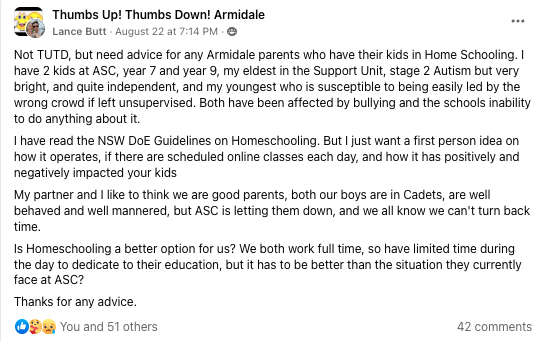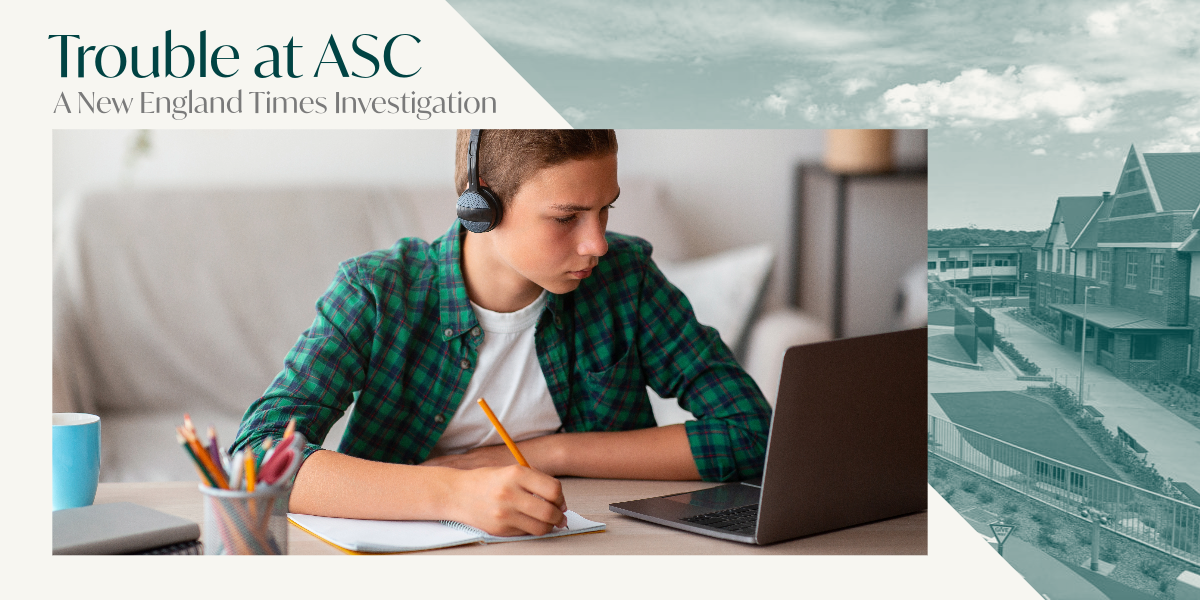As many parents become increasingly concerned about what their children are being exposed to as Armidale Secondary College, some are opting for home school.
Home schooling exploded in popularity across the country after the disruption of the pandemic lockdowns, so there’s also a lot more providers and it’s not the rare thing it used to be. Around a third of students nominate their main reason for choosing home schooling as a disability or health condition, and around 1% are choosing home school because of bullying.
Ellen Brown, the founder of Euka which is the largest provider of full time home school education in Australia, says what used to be home schooling is very different to what home schooling is now.
“We’ve got kids who’ll decide home schooling works best for lots of different reasons.”
“For some, COVID worked really well and the parents said ‘this is wonderful, we’re working from home, let’s do it’.”
“Others have come in because they’ve had some difficulties at school.”
“School is absolutely fantastic. But for some kids, it’s not fantastic,” she said.
“Now more than ever, we’ve reached that tipping point where it’s a lot more mainstream than it ever has been.”
There are a few rules and requirements, but there is also lots of support for interested parents. Some of the government regulations and systems have not kept pace with the shifting popularity of home schooling and technological advancements, however, so you may need to be patient and expect a few bumps as you get started.
What’s the process?
Under NSW law, is compulsory for all children to attend school until they have finished Year 10 or turned 17.
However, there are exceptions to that rule. If the child is enrolled in an approved alternative education program, such as going to TAFE, apprenticeships and traineeships, they don’t need to be enrolled in school. And if they are over 15, they can be exempted from school if they are in paid work or a combination of approved education or training and paid work.
Unless your child meets one of those exceptions, they must be enrolled in and attend a government or non-government school, or be registered for home schooling.
In order to home school your child, you need to do a few things:
- Do your research and know what you’re getting yourself in for. In particular, read the Guidelines for Home Schooling Registration in NSW (PDF, 50 pages, 900 KB). Join the Armidale Homeschoolers group on Facebook to connect with other local parents who are following this path and get their advice.
- Decide if you want to do distance education or home schooling (see more below).
- You need to apply to shift your child from normal school to home school or distance education. For home school, you need to apply to NESA – you can do this online and the application takes about 12 weeks to process.
- For either option, there are a number of requirements such as having appropriate supervision, check ups including potentially home visits, and you need to set up a suitable learning space for the child. For home school, you will need to provide documentation that you have a full learning plan for them, which is usually done by choosing a provider like Euka who will take care of that for you.
The Department’s information says parents considering home schooling registration on a temporary basis should contact their child’s school for advice. So, if perhaps if your child just needs a break for their mental health or to see if the bullying will stop, home schooling registration may not be required or suitable.
What’s different between home schooling and distance education?
Home school and distance education are not the same thing. Home schooling allows parents or carers to choose to educate their children at home, while distance education is what most students would have experienced during the lockdowns, with the same structure of classes throughout the day, and is intended to be schooling for students who are unable to access a local government school.
Home schooling is a completely valid and acceptable choice to educate children at home and you don’t need to justify why. In home schooling, a parent or carer is responsible for developing teaching and learning programs for their children.
Other than the required home visits and paperwork, the only significant note of caution about home schooling is that your child won’t be able to sit the HSC. They can study all the way through to Year 12, but the current rules don’t allow home schooled children to sit the HSC exams or get an ATAR. They can still go through to university but need to apply through alternative entry pathways.
In distance education, the school and teacher are responsible for developing, implementing and evaluating student learning programs. Full-time enrolment in distance education is available to students whose circumstances prevent them from attending a local school.
Eligibility categories for full-time enrolment in distance education include:
- geographic isolation
- students travelling within Australia
- students temporarily resident or travelling overseas
- students with a medical condition
- pregnant students/young parents
- vocationally talented students
- students with additional learning and support needs
- students in extraordinary circumstances
- students affiliated with the national school for travelling show children.
The ‘extraordinary circumstances’ category is where being a victim of ongoing bullying or school violence may qualify for distance education. However, the Department’s enrolment guidelines say that such enrolments need to be approved by a Director, Educational Learning (which is Matt Hobbs in Armidale) and that all other options need to be exhausted before distance education will be allowed in that category.
Distance education students will still sit the HSC like normal school.
Home school flexibility great for autistic and talented kids
While most kids being removed from ASC are going to O’Connor or one of the private schools, for parents of kids who are autistic, have learning disabilities, or are gifted and talented, the flexibility of home schooling is really appealing.

Euka founder Ellen Brown says their program allows for schooling to be tailored to the uniqueness of the child, where they are at, and what they need.
“Euka provides a full school program, so all the same subjects as they do at school, except in a very flexible way.”
“So the students can be at home, often they’re with groups and co-ops and all kinds of different situations, but one of the things that makes it extra helpful is that the flexibility and individualisation.”
“If a child starts with us for any reason, you know, at anywhere in their school journey and they might have fallen behind in a certain subject or if they’re gifted and they need to be able to go further ahead, we can adjust the program subjects to fit what the child needs, no matter where that is, and that’s what makes it very different to say, distance education.”
“Kids can go at their own pace as well. And that might mean that, say for teenagers for example, they might be night owls or they might be the kind that have got some sporting commitments or work commitments, they might decide to do all their schooling in three days and then they might be working for two days or training or all kinds of things.”
For neurodivergent children, home schooling not only has the advantages of not having the child in a distracting and challenging environment, and the flexibility to deliver their education in a way that works for them.
“We have one Autistic student and he just likes to focus on one subject for two weeks and get the whole term out. Say, science done first. Then he’ll turn to English and then he might turn to maths. That’s the way he learns best.”
“So, it’s really about saying, you know, here’s what the child needs as far as their education. Now let’s work out how it works best for the child.”
Home school doesn’t have to be lonely
For many parents, one of their biggest concerns about home schooling is that their children won’t make friends and will miss out on the important socialisation aspects of normal school. Ms Brown says there are enough home schooled kids now that they can get together and have those excursions and social events. Euka also provides broader interactions as part of their service.
“Those concerned about socialisation don’t seem to factor in the situation where much of the school socialisation can be the very reason a child needs to leave school.
“So one of the big things about home schooling socialisation is that kids are getting together kids that have things in common with and developing friendships around things like sport or hobbies or work, all kinds of things.”
“But it means that they’re not just forced into a friendship group just because of age.”
“You know, like as we become adults, we don’t pick our friends cause we’re the same age. We have the same things in common.”
“So that’s where homeschooling socialisation is so healthy because there’s multi age groups and they’ve got something in common.”
“We also run social groups with our kids, after school like cooking club on Thursday afternoons where we’ll have kids from all over the country jumping on together live and cooking a meal each week, you know, and they get to know each other.
“So they still have those opportunities to socialise and meet other kids, all over the country, which is something you never get to do when you’re at school,” she said.
“I don’t think there’d be a town that doesn’t have a homeschooling group these days.”
It’ll be ok
Ms Brown says that switching to home school can be overwhelming at first, but there’s plenty of support and you can always switch back.
“As a new homeschooler, it can feel a little bit overwhelming,” Ms Brown said.
“Like when you have your first child and everybody’s got advice for you. Homeschooling people are really enthusiastic, so they all want to share what they’re doing and it can feel overwhelming.”
“Just like when you have that first child, you know, it doesn’t take long before you go, ‘Oh, you know, I’ve got a handle on this’, because every child is different.”
“As a parent, your role is more of a coach than it is having to be a teacher. So that means that when the child sits down, they know exactly what they need to do, they jump on their portal, all their lessons are there for them, and they’re all written by their teachers.”
“But if your child comes to you and says, I’ve done this fractional lesson, I still don’t understand fractions, the parent can then reach out to the teacher and say, look, can we have a couple of extra resources or some support or some advice on what to do in this.”
“And it doesn’t have to be a forever thing.”
“We do sometimes have situations where kids will come out of school, they might be with Euka for a year or two, and then say, you know what? I might like to go back to school. And because we follow the same curriculum and we cover the same subjects and things as school, moving back in isn’t a problem.”
Find out more about:
Distance education: https://education.nsw.gov.au/teaching-and-learning/curriculum/rural-and-distance-education/distance-education
Home school requirements: https://educationstandards.nsw.edu.au/wps/portal/nesa/regulation/home-schooling/home-schooling-registration
Euka https://euka.edu.au/
Like what you’re reading? Support New England Times by making a small contribution today and help us keep delivering local news paywall-free. Support now


